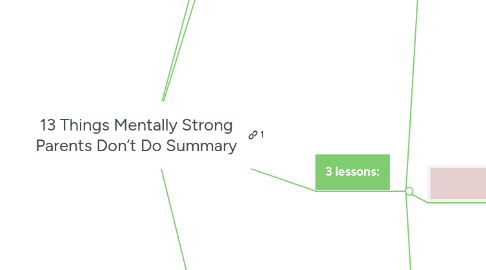
1. 1-Sentence-Summary:
1.1. 13 Things Mentally Strong Parents Don’t Do teaches parents how to stop being a roadblock to their kids academic, behavioral, and emotional success by outlining ways to develop the right thinking habits.
2. Favorite quote from the author:
2.1. "Learning how to manage emotions and endure unpleasant feelings are skills that can be taught." - Amy Morin
3. 3 lessons:
3.1. Help your child be responsible and persevere rather than be a victim.
3.1.1. The best way we can teach our kids is by example.
3.1.1.1. So if you want a child that’s mentally strong, you need to start showing them what this looks like.
3.1.1.2. One way you can do this is by not encouraging a victim mentality.
3.1.2. It’s natural for us to want to shield our children from things and defend them when they’ve been wronged.
3.1.2.1. But it’s important to make sure you show them how to deal with life’s challenges instead of viewing themself as a victim of circumstance.
3.1.3. Here's an example:
3.1.4. Don’t let kids shy away from assuming responsibility.
3.1.5. Hold your child accountable instead of letting them blame others for their problems.
3.1.6. In addition, let them practice resolving conflict on their own instead of always intervening, as this makes them more likely to blame others.
3.2. Don’t expect perfection or step in to help every time they mess up.
3.2.1. Pushing your kid to perfection is bad for their mental health.
3.2.1.1. When you expect perfection, they start to believe your love is conditional and you won’t love them if they make a mistake.
3.2.2. If you want to make sure mistakes don’t destroy their sense of self-worth, help them try for excellence rather than perfection.
3.2.3. Don’t criticize too much.
3.2.4. Morin says you can offer what she calls a praise-criticism-praise sandwich.
3.2.4.1. This can be like, “Great job cleaning up the playroom! I noticed you missed a few blocks, but you did great at cleaning up your markers.”
3.2.5. When we expect perfection we also tend to micromanage and overstep, which leads kids to not learn how to bounce back when they make a mistake.
3.2.6. Helicopter parenting leads to kids not knowing how to make decisions in adulthood and struggling with taking care of their own needs.
3.2.6.1. These kids are more likely to have mental health problems, physical health problems, and do recreational drugs.
3.2.7. Instead of doing this, help them learn when they slip up that what’s most important is how they overcome problems.
3.2.7.1. Talk with your child about times you recovered from setbacks so they can see nobody is perfect, and it’s okay.
3.3. Mentally strong parents only do things that match the values they teach.
3.3.1. An example:
3.3.2. It’s important to emphasize the values you want to instill, and you can do this more with what you do than what you say.
3.3.3. A 2014 survey found 80 percent of teens believed their parents prioritized achievement over kindness.
3.3.4. One way you can make sure kids know what values are important is to make a family mission statement
3.3.4.1. Have values you want to include beforehand, and with everyone’s input, make a short statement about what’s most important to your family. Post it somewhere they will see it.
3.3.5. You can also instill values early in life by explaining why you do good things when they are young.
3.3.5.1. You can explain that you are making dinner for a sick neighbor because it’s important to do kind things for people.
3.3.5.2. Through your example, your child will learn through this that we use what we have to try to make the world around us a better place.
